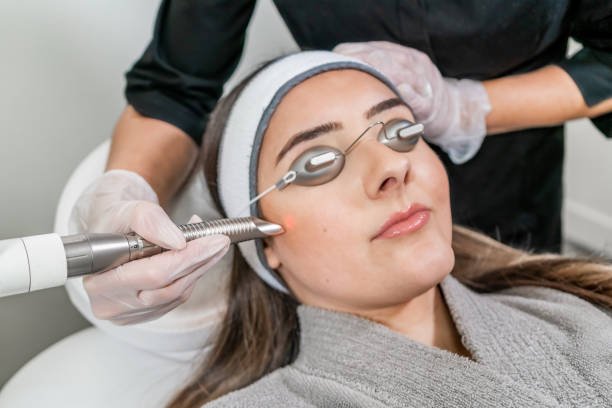Laser treatment has revolutionized the beauty and skincare industry by offering effective solutions for a variety of concerns, from acne scars to fine lines and wrinkles. However, for individuals with sensitive skin, the thought of undergoing such a procedure can raise questions about safety and potential side effects. In this blog, we’ll explore the safety of laser treatment for sensitive skin areas and provide insights into the best practices to ensure optimal results.
Understanding Laser Treatment
Laser treatment involves using focused beams of light to target specific skin issues. These treatments are highly customizable, allowing professionals to tailor them based on skin type, condition, and desired outcomes. Popular applications include:
- Laser skin resurfacing: This method rejuvenates the skin by removing its damaged outer layers, stimulating collagen production, and reducing imperfections.
- Fotona laser treatment: A versatile and non-invasive procedure, Fotona lasers address various concerns such as wrinkles, pigmentation, and even weight management through skin tightening.
- Laser hair removal: Aimed at permanently reducing unwanted hair growth.
Despite its versatility, the sensitivity of certain skin areas—such as the face, neck, and underarms—requires extra caution.
Challenges of Treating Sensitive Skin with Lasers
Sensitive skin is often more reactive to external stimuli, including heat and light, making it more prone to redness, irritation, and inflammation. This reactivity poses challenges when using laser treatment services. However, advances in laser technology, like Fotona laser treatment, have made it possible to safely treat even the most delicate skin.
Common Concerns
- Post-Treatment Redness and Swelling: Sensitive skin areas may experience more pronounced redness or swelling after treatment.
- Risk of Burns or Hyperpigmentation: If not performed correctly, laser treatments can cause burns or uneven skin tone.
- Increased Skin Dryness: Laser treatments can sometimes strip natural oils, leaving sensitive areas feeling dry or flaky.
- Delayed Healing: Sensitive skin may take longer to recover compared to less reactive skin types.
Ensuring Safety for Sensitive Skin
Despite these challenges, laser treatments are generally safe for sensitive skin areas when performed by trained professionals. Here are some essential safety measures:
1. Consult with a Specialist
Before undergoing any laser treatment services, consult a dermatologist or certified laser technician. They will assess your skin type and recommend the most suitable laser options, such as Fotona laser treatment for its gentler approach.
2. Patch Test
A patch test on a small area can help determine how your sensitive skin reacts to the laser. This step minimizes the risk of adverse reactions during the actual treatment.
3. Choose the Right Laser
Some lasers are more suitable for sensitive skin. For instance, fractional lasers used in laser skin resurfacing offer targeted results with minimal damage to surrounding tissue.
4. Follow Pre-Treatment Guidelines
Avoid sun exposure, exfoliants, and harsh skincare products before your appointment. Prepping your skin properly reduces the risk of complications.
5. Post-Treatment Care
Post-treatment care is crucial for sensitive skin. Use gentle cleansers, apply soothing moisturizers, and avoid sun exposure to aid healing and prevent irritation.
Benefits of Laser Treatment for Sensitive Skin
When done correctly, laser treatments can provide significant benefits even for individuals with sensitive skin. These include:
- Improved Skin Texture: Laser skin resurfacing promotes collagen production, leading to smoother and firmer skin.
- Reduction in Redness and Pigmentation: Certain lasers target vascular issues and pigmentation, improving overall skin tone.
- Non-Invasive Approach: Treatments like Fotona laser therapy offer effective results without the need for surgery.
- Weight Management Support: Some advanced laser systems can assist with skin tightening, indirectly supporting weight management goals by improving the appearance of sagging skin.
Popular Laser Treatments for Sensitive Skin Areas
1. Fotona Laser Treatment
Fotona lasers are highly adaptable, offering a range of treatments from gentle resurfacing to collagen stimulation. Their non-ablative modes are especially suited for sensitive skin, as they minimize discomfort and downtime.
2. Fractional Lasers
Fractional laser skin resurfacing is ideal for treating fine lines, wrinkles, and scars without causing significant damage to the skin’s surface.
3. Pulsed-Dye Lasers
These lasers target blood vessels and are effective for reducing redness, making them an excellent choice for conditions like rosacea.
Who Should Avoid Laser Treatments?
While laser treatments are safe for most people, certain individuals should exercise caution:
- Pregnant or Nursing Women: Hormonal changes can affect skin sensitivity and healing.
- People with Active Skin Infections or Open Wounds: Lasers can aggravate these conditions.
- Individuals Taking Certain Medications: Medications like Accutane can make the skin more susceptible to damage.
Always disclose your medical history to your provider to ensure the treatment is appropriate for you.
What to Expect During and After Treatment
During Treatment
- Most laser treatments for sensitive areas are quick and involve minimal discomfort. Cooling mechanisms are often used to keep the skin comfortable.
After Treatment
- Mild redness and swelling are common but typically subside within a few days. Follow all post-treatment instructions provided by your practitioner to ensure a smooth recovery.
Conclusion
Laser treatment for sensitive skin areas can be both safe and effective when performed by experienced professionals. By choosing advanced technologies like Fotona laser treatment and following recommended guidelines, you can achieve your skincare goals without compromising your skin’s health.
Whether you’re considering laser skin resurfacing for smoother skin or exploring options for weight management through non-invasive methods, understanding the process and taking necessary precautions will help you make an informed decision. Always prioritize professional consultations and invest in the right laser treatment services to ensure optimal results for your sensitive skin.






